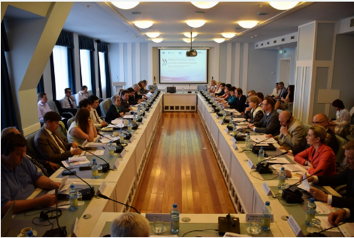
The launch of the third cycle of the Small Business Act for Europe (SBA) assessment took place in Minsk, Belarus on 29 May with a high-level public-private Working Group meeting under the umbrella of the Council for Entrepreneurship Development.
The meeting was organised by the OECD in the framework of the EU-funded project ‘EU4Business: From Policies to Action’. The Small Business Act for Europe is an overarching framework for the EU policy on SMEs. It aims to improve the approach to entrepreneurship in Europe, simplify the regulatory and policy environment for SMEs, and remove the remaining barriers to their development.
The Working Group meeting was opened by the chairman of the Council for Entrepreneurship Development, Alexander Turchin, the EU Ambassador to Belarus, Andrea Wiktorin, and the OECD. In addition to launching the new assessment cycle, the Working Group provided an opportunity for the government to present an overview of the progress achieved in implementing SME policies since the previous SBA assessment cycle (2015-16).
During the meeting, representatives of the Ministry of Economy, the Ministry of Justice, the National Bank, the Ministry of Antimonopoly and Trade as well as the Development Bank highlighted recent SME reforms, such as the recently approved Presidential Decree Number 7, substantially simplifying regulations for doing business in Belarus.
Business associations and independent research centres commented on the results of these reforms, and emphasised remaining challenges. They highlighted barriers such as unfair competition stemming from large state-owned enterprises and inefficiencies in the domestic judicial system, as well as traditional challenges such as access to finance and availability of skilled workers.
The OECD and the European Commission presented the assessment framework and timeline for the third SBA assessment cycle. This cycle aims to broaden the scope of the assessment to allow for an evaluation of the overall business environment conditions for enterprises – with a particular focus on business integrity, competition and contract enforcement.
In addition, private sector perspectives on policy barriers and policy effectiveness will be taken into account to a greater extent, by holding private sector focus groups in each country and encouraging active private sector contribution to working group meetings.
The Working Group was preceded in the morning by an OECD organised capacity building seminar on SME financing indicators, to support the government, in particular the National Bank of Belarus and the National Statistical Committee Belstat, in collecting, analysing and disseminating official statistics in the area of SME financing. Kris Boschmans, senior expert from the OECD Centre for Entrepreneurship, SMEs, Regions and Cities, presented the OECD Scoreboard on Financing SMEs and Entrepreneurs as the main methodological reference, which documents the state of access to finance for entrepreneurs and SMEs and annually monitors trends in 43 OECD and non-OECD countries.